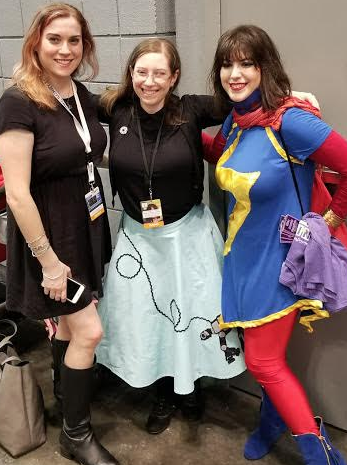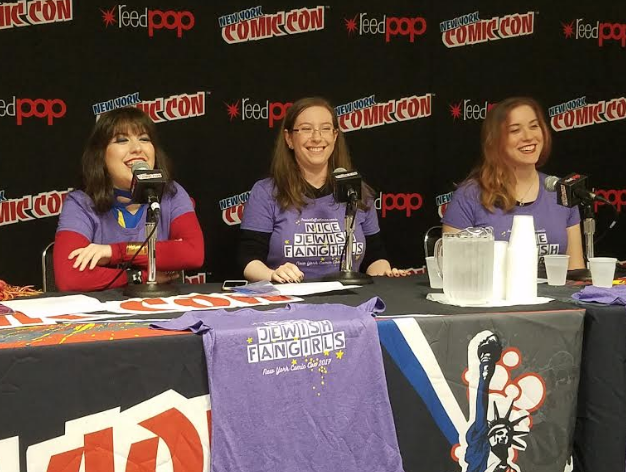
Jewish, Feminist, and Into Star Wars? There’s a Podcast for That.
The first level is the disenfranchisement of women. While Wonder Woman and its charming Israeli actress, Gal Gadot, have carved space for female protagonists in the superhero universe, the film’s popularity hasn’t negated the fact that not all women are at ease in fandom communities. “OLUF and Nice Jewish Girls exist because there are so many male nerds already,” Michal noted. “We just want a space of our own—as women—to feel comfortable.” “There are definitely lovely male nerds,” she continues, “but there are some who, when you get into an argument with them, expect to have the last word.”
Michal also addresses the more blatant forms of misogyny that exist in fandom. “Lots of men don’t expect me to know a lot about fandom.”
“Sports fandom is particularly sexist,” SM added. “When I tell men that I know random sports stats, they’re shocked. I also once got an e-mail for a father-son baseball sweepstakes. Why couldn’t it be a father-daughter sweepstakes? Or a mother-son? Or a mother-daughter?”
The podcast also expresses the disenfranchisement the hosts experience in their Orthodox community because of their participation in fan culture. Orthodoxy is traditionally known for encouraging the pursuit of the sacred and using one’s fleeting existence to embody the Torah’s values. Allowing oneself to be engrossed in the alternate dimensions of Rick and Morty and Game of Thrones is trivial and, as Orthodox rabbis might mutter disapprovingly, sheer “narishkeit” (“foolishness” in Yiddish). Being overtly obsessed with fandom, then, can cause Orthodox women to feel alienated.
To counter this belief, Michal asserted gently, “What often draws people to fandom is the act of being intellectually engaged and inquisitive. These are the same qualities that Judaism values.” Indeed, fervent curiosity about these fictional worlds is reminiscent of being drawn to the more provocative, mythical aspects of Jewish learning (like the giants, angels, and demons mentioned in midrash and kabbalah).
On OLUF’s about page, Michal combines Orthodoxy and fandom. “Thinking about a modest cosplay? Have a random dvar Torah related to Star Wars? Then this is the group for you!,” reads the description. And on the podcast, all three women interweave their Jewish daily lives with what’s currently on their geek radar. For instance, before the High Holidays, the Nice Jewish Fangirls analyzed how bad guys, like Severus Snape from Harry Potter and Jaime Lannister from Game of Thrones, repent and are redeemed. They also question why more female characters don’t get to have the rich character arc of committing teshuvah.
Having a medium where one can mix Torah with Thor and Potter with Passover makes a significant difference for those who once couldn’t celebrate fandom within their religious communities. “I always thought of my friends in two distinct groups,” reminisced Tamar. “My Jewish friends whom I could relate to about Jewish things, and my fan friends whom I could relate to about fan things. But ever since the OLUF group and podcast, these two groups have meshed. Nowadays,” she continued, “it’s pretty common for my friends and me to lace our Shabbat meals with discussions about Marvel comics.”
Nice Jewish Fangirls also engages listeners by bringing in kickass Jewish women to speak about their professional roles in fandom. “We’ve had Leetal Platt and Navah Wolfe come on our show. Leetal is a fashion designer who does a lot of fandom related items for Her Universe and Navah is a Hugo-nominated editor at Saga Press specializing in fantasy and sci-fi,” said Michal.
“We also had my father come on!” SM chimed in. SM’s father is the author of The (Unofficial) Hogwarts Haggadah, a haggadah that creates parallels between Passover and Harry Potter.
Who are some of NJF’s dream guests? Steven Spielberg, Mayim Bialik, and Gal Gadot to name just a few. “We reached out to Josh Gad [who’s in Frozen and Murder on the Orient Express],” Michal mentioned, “But his publicist said he’s busy now.”
The bravery that it took for NJF to shoot an e-mail in the dark to Josh Gad is also what compelled them to apply for New York’s 2017 Comic Con, the annual pop culture convention that hosts the latest in comics, graphic novels, manga, video games, and movies. “Last year, I was waiting for a YA [Young Adult] panel at San Diego Comic Con to start, and [in the meantime] sat in on a panel for the ‘Christian Comic Arts Society’,” Michal said. “This triggered the thought of why can’t I get a Jewish panel going? I submitted the request while I was on a plane, and I told Comic Con that Nice Jewish Fangirls can only host a panel on Sunday and not on Thursday, Friday, and Saturday because of the Sukkot holiday. I had no idea they’d actually accommodate us! We’re such a niche group to begin with! But they did accommodate us, and we came in on Sunday.”
Why didn’t Comic Con immediately toss out an application with such time-based requests? “It’s because Comic Con is working toward inclusivity of all genders, races, ethnicities, and denominations within fandom,” explained Tamar. And knowing how vital inclusivity is, Tamar ensured that their application welcomed Jews of all affiliations, not only Orthodox ones. “We wanted to make it as welcoming as possible.”
And welcoming it was. “Jewing Fandom Right,” the name of the NJF’s Comic Con 2017 panel, packed a room to maximum capacity (250 guests). “I thought the only one who was going to watch it was my mom,” SM said with a straight face. “But there was a line out the door to our panel. We were confused. At first, we were convinced that these people must be waiting for the panel after ours. But then they came pouring into our room, and they were here for us. We were, like, whoa, this is insane.”
Were all of these guests Orthodox? “No,” said Michal. “About 30 to 40 people were, but a lot of them weren’t.”
Nice Jewish Fangirls’ panel during Comic Con is worth a watch. They challenge their audience, and their audience challenges them. They speak about what it is about geekery that lights their proverbial fire. Each host is motivated by a desire to ensure that Jewishness and fandom run parallel—instead of diverging, breaking, and losing devotees.
When asked how, exactly, Hollywood and fan culture can include Jews more, Tamar answered simply: “Just represent them more. Sounds banal, but I shouldn’t be brought to tears of excitement when a character is actively Jewish in a book and uses their Jewish identity as a plot point. But I am brought to tears because it’s so rare.”

The Nice Jewish Fangirls hosting “Jewing Fandom Right.” Photo credit: Yael Schick
SM contributed to the important conversation of inclusivity in fandom by stating, “Put more women behind the camera. Yes, Patty Jenkins directed Wonder Woman, and that’s great…There’s a Lord of the Flies movie that’s coming out with girls on the island [instead of boys]. But did you know that that movie has two men writing it? I don’t trust a couple of random dudes to do this.”
They also talked about the use of Nazi imagery in CW’s TV show Supergirl and in Freedom Fighters: The Ray, an upcoming animated web series premiering in December 2017. The latter show’s trailer imagines a dark world where the Nazis won World War II, and now superheroes are tasked to defeat them. Seriously, CW? “Nazi is not code word for bad guys,” Tamar decried. “Nazis [are] a horrific thing to anyone who is remotely different in society. Hollywood lost that nuance between what constitutes ‘bad guys’ and what constitutes pure evil. It’s so repulsive to me. Just stop using Nazis and Nazi imagery already!”
The Nice Jewish Fangirls had never met the majority of the attendees in the room. “When I saw all those people gathering in,” said Tamar, “it validated my idea there’s no forum for Jewish people to discuss fandom and how it cliques with Judaism, despite the fact that so much of fandom is influenced by Judaism.”
The energy behind these three women’s’ opinions about inclusion is a similar energy that belies their interest in everything ranging from Korean Pop Culture to DC Comics. Their podcast discussions are informed, thoughtful, analytical, and, sometimes, simply funny. And, most importantly, listening to them is comforting to people who have felt that larger institutions (like misogyny or Orthodoxy) inhibit them from feeling completely content within their geekiness.
Nice Jewish Girls Fangirls is a symbol of feminism and Jewish unity, and their appearance at Comic Con is only the start. (Hear that, Mayim Bialik? Get on their podcast!) And maybe, just maybe, these women can one day inspire J.K. Rowling to write Anthony Goldstein and the Magical Menorah…or you know…any Judaic item of her choosing.
The views and opinions expressed in this article are the author’s own and do not necessarily reflect those of Lilith Magazine.
2 comments on “Jewish, Feminist, and Into Star Wars? There’s a Podcast for That.”
Comments are closed.




I would love for you to check out a new comic Off Girl !. Issues 1,2,3 free to read at offgirl.com . Off Girl’s demon is Lilith – cursed for leaving Adam and disobeying Goddurlak. It’s sexy, feminist and fun. Tina… Writer and Publisher
Oh, well–at least the CW acknowledges that the Nazis WERE “bad guys”. Of late, some people seem a little unclear on this concept. The media could and should do a better job of showing how harmful fascism and other forms of tyranny have been to MOST members of tyrannical societies. Many who collaborated with Nazism thought it would be good for them–and they were in for a surprise. If nothing else, almost everybody misses the right to free speech when it’s gone.
Hey, media: any chance for a (very-updated) revival of “It Can’t Happen Here”? Maybe a futuristic, sci-fi version?